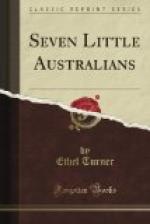The other note was equally unfortunate. Little Flossie went home, her thoughts intent upon a certain Grannie bonnet Nell had promised to make for her new doll.
“Gween with pink stwings,” she was saying softly to herself as she climbed the steps to her own door.
Alan was lying on the veranda lounge, smoking his black pipe.
“Gween what?” he laughed—“guinea-pigs or kangaroos?”
“Clawice Maud’s bonnet,” the little girl said, and entered forthwith into a grave discussion with him as to the colour he thought more suitable for that waxen lady’s winter cloak.
Then she turned to go in.
“What’s that sticking out of your wee pocket, Flossie girl?” he said, as she brushed past him. She stopped a second and felt.
“Oh, nearly I didn’t wemember, an’ I pwomised I would—it’s a letter for you, Alan,” she said, and gave Meg’s poor little epistle up into the very hands of the Philistine.
CHAPTER VIII A Catapult and a Catastrophe
“Oh, sweet pale Margaret,
Oh, rare pale Margaret,
What lit your eyes with tearful
power?”
The dusk had fallen very softly and tenderly over the garden, and the paddocks, and the river. There was just the faintest wind at the waters edge, but it seemed almost too tired after the hot, long day to breathe and make ripples. Very slowly the grey, still light deepened, and a white star or two came out and blinked up away in the high, far heavens. Down behind the gum trees, across the river, there was a still whiter moon; a stretch of water near was beginning to smile up to it. Meg hoped it would not climb past the tree-tops before eight o’clock, or the long paddocks would be flooded, with light and she would be seen. At tea-time, and during the early part of the evening, she was preoccupied and inclined to be irritable in her anxiety, and she snubbed Bunty two or three times quite unkindly.
He had been hovering about her ever since six o’clock in almost a pitiable way.
It was characteristic of this small boy that when he had been tempted into departing from the paths of truth he was absolutely wretched until he had confessed, and rubbed his little unclean hands into his wet eyes until he was “a sight to dream of, not to tell.”
Pip said it was because he was a coward, and had not the moral courage to go to sleep with a lie on his soul, for fear he might wake up and see an angel with a fiery sword standing by his bedside. And I must sorrowfully acknowledge this seemed a truer view of the case than believing the boy was really impressed with the heinousness of his offence and anxious to make amends. For the very next day, if occasion sufficiently strong offered, he would fall again, and the very next night would creep up to somebody and whimper, with his knuckles in his eyes, that he had “t—t—told a s—s—story, boo—hoo!”




